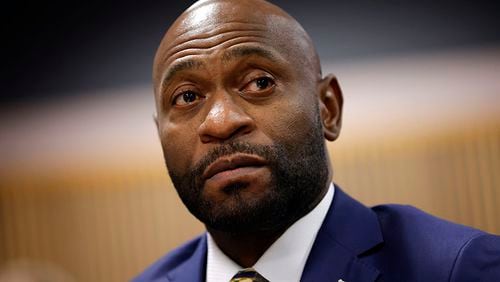Nathan Wade, the former lead prosecutor on the Fulton County election interference case, defended his work on the probe and his onetime romantic relationship with District Attorney Fani Willis, which became the subject of a days-long evidentiary hearing that drew international media attention.
In his first interview since he resigned from the case in March, Wade told ABC News that workplace romances are “as American as apple pie” and that he did not believe his actions compromised case, which involves criminal charges against former President Donald Trump and 14 additional remaining defendants.
“My private life became the focal point of the case, and my private life has nothing to do with the merits of that prosecution,” he said.
Wade told the network that he and Willis had privately acknowledged the thorny nature of their relationship given their work on the case. And he said the timing “could have been better.”
“It wasn’t lost upon the two of us that things could bleed over into the case and start to affect it,” he said. But Wade added that “when you are in the middle of it, these feelings are developing and you get to a point where the feelings are so strong that you start to want to do things that really are none of the public’s concern.”
In January, attorneys representing nine of the defendants argued that Wade and Willis’ “improper” relationship created a conflict of interest for the DA and that she and her office should be removed from the case. Wade had billed hundreds of thousands of dollars in legal fees for his work while he was with Willis, and the two took several vacations together, with Wade footing many of the bills, at least initially. His law partners were also paid nearly $200,000 for work on other matters with the DA’s office.
With the DA’s office and defense attorneys offering dueling facts on certain issues, including when the relationship began and how Willis reimbursed Wade for travel, Superior Court Judge Scott McAfee scheduled an evidentiary hearing in February. Both Willis and Wade testified under oath, sparring with defense attorneys who aired deeply personal information about them.
Wade and Willis each testified that their romantic relationship began in spring 2022 and ended in summer 2023, not long before the indictment in the case was handed up by a grand jury. Defense attorneys contended that the romantic relationship began before Wade was hired in November 2021 and that Wade had lied in his divorce filings under oath.
McAfee ultimately ruled that he could not discern the absolute truth on many facts, including when their relationship began, based on conflicting and unreliable testimony. But he wrote that “an odor of mendacity remains.” While McAfee ruled that the defense had failed to prove that Willis had an actual conflict of interest that merited her disqualification, he reprimanded the DA for a “tremendous lapse in judgment” and directed Willis to either step aside from the case or request Wade’s resignation. By the end of the day, Wade had tendered his resignation.
The defendants have appealed McAfee’s decision. The Georgia Court of Appeals is expected to announce whether it will take up the matter within the next week.
Wade said he had received threats for his work on the case. And he was particularly critical of McAfee’s decision to hold the evidentiary hearing, which he believes “essentially made a mockery of the profession.”
“I was not thrilled at all that the system that I’ve dedicated my life to, and that I’ve put so much into, would even allow a sideshow like this,” Wade said. “I thought that it would be dealt with swiftly, without the need for an entire circus. But unfortunately, it wasn’t.”
The Fulton DA’s office declined to comment on Wade’s interview. Wade and his attorney previously did not respond to interview requests from the AJC.
Wade also suggested McAfee, who is white, may have had a “cultural lack of understanding” regarding one of the other major points of contention at the hearing: Willis’ testimony that she had reimbursed Wade for many travel expenses in cash. Willis and her father suggested in their testimony that many Black people complete financial transactions in cash due to lingering mistrust in the financial system, which stems from decades of discrimination.
“Culturally we do things that other cultures may not. We might keep cash and other cultures may not do that,” Wade said.
About the Author








